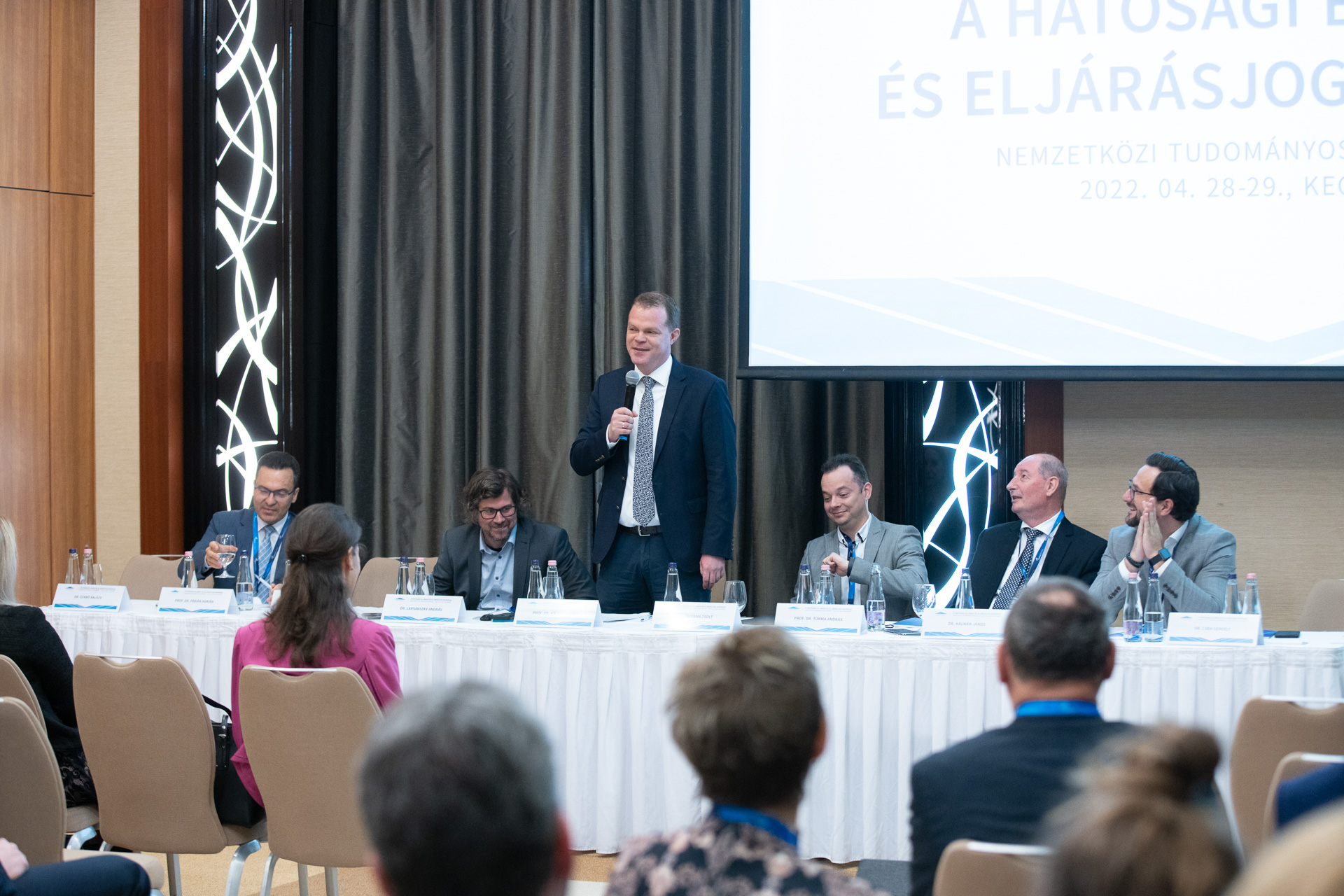Our meeting was organised by the Foundation for the Development of Democratic Local Public Administration and the Central and Eastern European Association for Public Administration (KTE) on 28-29 April 2022 in Kecskemét.
The organisers of the event aimed at bringing together the faculties of administrative law of the Hungarian faculties of law and the University of Public Service to present their views on the challenges of administrative procedure in the context of global trends (e.g. digitalisation, global economic challenges, crisis, pandemic, competition between countries, multinational companies). In line with this objective, all the faculties of law of the country and the University of Public Service were represented at the Meeting in Kecskemét.

The Meeting in Kecskemét was opened by András Koltay, who said that public administrations need to keep up with new technologies and find answers to crises such as the epidemic situation and the war in Ukraine.
After the opening ceremony András Lapsánszky gave a presentation on the challenges of official proceedings. Then, Adrián Fábián presented the opportunities and legal challenges of electronic decision-making in the public authority procedure. The third speaker was Krisztina Rozsnyai, who spoke on current regulatory and enforcement issues of procedural obligations. The next presentation took the audience into the future, with András Torma and Balázs Szabó presenting the general rules of the future administrative procedure, highlighting the impact it will have on public administration staff and customers. The next speaker, János Kálmán, gave a presentation on decisions of general application, outlining how they can be placed in the system of administrative case law. The final presentation of the morning session was given by Zsolt Czékmann on the role of automatic decision making in the procedural law system and what the future holds for this legal instrument.
After the lunch break, the programme of the Meeting continued in two parallel sessions.
In one of the afternoon sessions, Erzsébet Csatlós presented the role of consular protection in European public administration and recent developments.Then János Fazekas gave an interesting presentation on the procedural and litigation aspects of the review of government action. The third speaker, Annamária Eszter Szabó, guided the conference participants through the new challenges of heritage protection and the responses to them. In the next lecture, Mihály Attila Nagy presented some of the challenges and experiences of the election process. Finally, Zsuzsanna Árva presented the legal nature of COVID-19 sanctions and some procedural issues. Following a coffee break, István Balázs continued the session by exploring some of the current issues in the application of procedural law by public authorities in emergency situations. Balázs Szabolcs Gerencsér talked about the Europeanisation of administrative procedural law, followed by András Patyi, who gave the audience an overview of the changes in administrative procedural law from 1990 to the present day in the light of the formative decisions of the Constitutional Court. The next lecturer was Barnabás Hajas who spoke about the cohesion issues of the amendments to the Code of General Administrative Procedure, seeking an answer to the question of whether the text of the Code has been disrupted. Rita Gyurita presented to the conference the legal instruments aimed at speeding up and simplifying procedures. To conclude the session, Mr Rixer gave a very interesting presentation on the forms of associations in public administration and their scientific impact, including an international perspective.
The other afternoon session featured presentations in English. Firstly, István Hoffman spoke about the changes and challenges in administrative procedures due to the epidemic situation. This was followed by a presentation by Kateřina Frumarová on the measures taken by the Czech Republic during the COVID epidemic to ensure smooth administrative procedures, and a presentation by Lilla Garayová on the reforms needed in the context of the digitalisation of administrative procedures. The next speaker was Daniela Dzuráková, who presented how the public administration has applied technology in the wake of the epidemic and what the future holds for the changes introduced. After a coffee break, Gábor Hulkó presented the problems and challenges of implementing the Digital Services Regulation. Afterwards, Virág Balogh spoke about the spread of the digital economy and its consumer protection issues. The next speaker, András Tóth, spoke about the practice of the Administrative Court in competition cases. Zsolt Czékmann and Eszter Czibrik gave a presentation on the new Real Estate Registration Act and how it relates to the rules of the Code of General Administrative Procedure. Afterwards, Gergely Patyi gave a presentation on the current issues and challenges of the official control of lawyers by the Bar. And last but not least, Lajos Csörgits spoke about the experiences of the mayor and notary during the epidemic with the local government administration.
